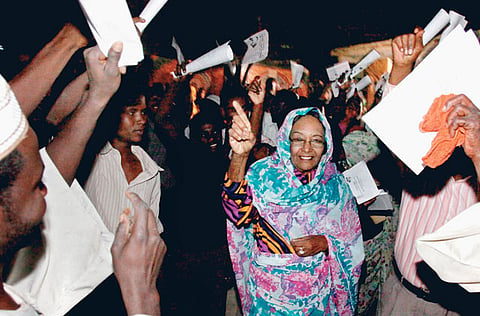Al Bashir win almost certain in elections
Sudan shoots down Washington's suggestion that poll be delayed briefly

Khartoum: Sudan's first multi-party elections in 24 years are on track to start on Sunday, with Khartoum dismissing a US suggestion that it would consider supporting a brief delay to ensure greater stability.
Incumbent President Omar Hassan Al Bashir hopes a win in the complex presidential, legislative and gubernatorial polls would legitimise his government, in defiance of an International Criminal Court warrant for his arrest for war crimes in Darfur.
An Al Bashir victory is almost certain after his two main rivals withdrew, alleging widespread fraud, but it would be overshadowed by questions over the elections' credibility.
"Even if all these parties participated I don't think there would be fair or credible elections," said Sudanese activist Omar Al Garrei, founder of the Democracy First group.
Western powers, particularly Washington, have made it clear that no matter how bad the elections are, their priority is that Sudan holds a peaceful referendum next year when the south of the country votes on whether to secede.
But the US ambassador to the United Nations suggested that Washington might accept a late start to the polls, which along with the referendum are a key stage in a 2005 north-south peace deal which ended Sudan's 22-year civil war.
"I think our view has been that if a very brief delay were decided to be necessary, and we thought that a brief delay would enable the process to be more credible, we would be prepared to entertain that," Ambassador Susan Rice told reporters.
"That's obviously up to the authorities themselves, but the larger picture is that much is awry in this process, and that is a real concern," she said.
Khartoum's UN ambassador Abdul Mahmoud Abdul Haleem rejected the suggestion.
"The government itself cannot do that and elections are not going to be delayed at all," he told reporters.
"After all, these types of functions [are] the responsibility of the national electoral commission and not the government."
The election results are likely to stand, even if voting provokes as much controversy as last year's Afghan presidential polls which were marked by fraud.
"These elections could be as bad as Afghanistan but with such a tight timetable before the referendum I doubt anyone will insist on a rerun," said one international source following the polls.
The semi-autonomous south is widely expected to vote for independence in the 2011 referendum.
All Sudan's opposition parties agree Al Bashir's National Congress Party, which has ruled for 21 years, has tried to rig the polls but they failed to agree on a joint reaction.
Smaller groups
While two of the largest parties agreed to boycott the polls in most of Sudan's north, other smaller groups remain in the race. International observer missions from the European Union and the Carter Centre will still monitor voting.
However, a seven-year conflict has hindered movement in Darfur.
The EU said it could not effectively observe the polls there and withdrew its observers from the western region.
The International Crisis Group think tank said Darfur had been so manipulated, with many of the region's millions of displaced people not registered to vote, that the territory could swing the national vote and secure a win for Al Bashir.
Sign up for the Daily Briefing
Get the latest news and updates straight to your inbox


